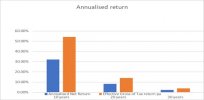Brendan Burgess
Founder
- Messages
- 55,428
This was raised in another thread . I have never seen an example of how it works in practice.
Let's say I am 65 and am worth €1m which I want to leave to one daughter.
I am in good health.
I take out insurance for the CAT bill.
The CAT bill if I were to die today would be about €220k (€1m -€335k) @33%
So I take out insurance for €220k.
1) How much would that cost me?
2) It's a whole of life policy as I understand it. The premium is fixed and I pay it every year I live.
3) If I die early , it's great value. If I live to 100 it's probably bad value.
4) I presume that the premium is fixed at the outset?
5) Is the premium for a Section 72 policy the same as the premium for an ordinary life insurance policy?
Let's say I die at 75, my daughter gets a pay out of €220k tax-free.
But what if my assets have reduced and the CAT liability is only €100k?
Or let's say when I die my asset are worth €2m. She will have a CAT bill of €550k. She gets €220k tax-free and pays the €330k.
Let's say I am 65 and am worth €1m which I want to leave to one daughter.
I am in good health.
I take out insurance for the CAT bill.
The CAT bill if I were to die today would be about €220k (€1m -€335k) @33%
So I take out insurance for €220k.
1) How much would that cost me?
2) It's a whole of life policy as I understand it. The premium is fixed and I pay it every year I live.
3) If I die early , it's great value. If I live to 100 it's probably bad value.
4) I presume that the premium is fixed at the outset?
5) Is the premium for a Section 72 policy the same as the premium for an ordinary life insurance policy?
Let's say I die at 75, my daughter gets a pay out of €220k tax-free.
But what if my assets have reduced and the CAT liability is only €100k?
Or let's say when I die my asset are worth €2m. She will have a CAT bill of €550k. She gets €220k tax-free and pays the €330k.
Last edited:

